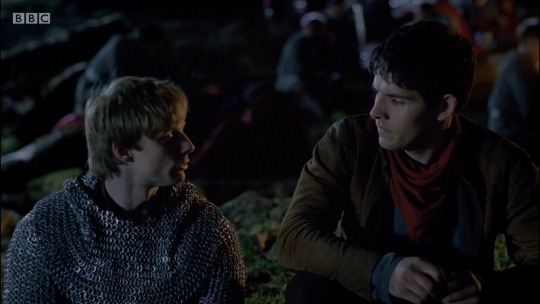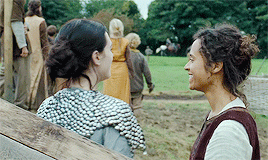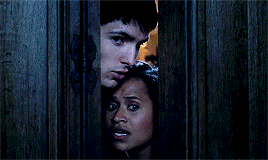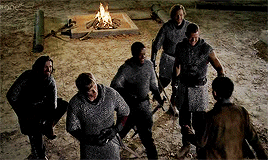#(gwen’s friendships with morgana and merlin were so ignored after season 1 and 2)
Explore tagged Tumblr posts
Text
The Tears of Uther Pendragon (Part 1)
There isn’t much to say about this episode. It’s not a particular strong opening episode, as per the norm with Merlin, but there are two things I can’t understand:
1. How Merlin survived Morgause’s attempt to kill him (and why she tried to do in such a way) and neither Morgana nor Morgause suspected he had magic. Did they really think Merlin was “just” a servant after everything he did?
2. Why Uther was so hellbent on finding Morgana when he was seemingly okay with her absence in the season 2 finale. His newfound love for Morgana makes no sense. All of a sudden, she can do no wrong.
Anyway, the most “memorable” parts of this episode were Arthur bullying Merlin. He really doesn’t know or, care to know, how hard it is to clean the floor on your hands and knees. Not only does he have no consideration for Merlin’s work, he also ruins it on purpose. He dumped a bucket of dirty water over Merlin’s head and wiped a dirty rag on his face. That’s fucked up on so many levels: for one, it’s unhygienic, irritating, and bothersome (Merlin probably couldn’t even wash his hair or changes his clothes); for another, it’s disrespecting Merlin’s work (the floor got dirty again and Merlin had to clean up the water); most of all, however, it’s undignified and degrading. Arthur even bullies Merlin again during his sword practice. Merlin got back at him this time, but it wasn’t satisfying in the slightest considering Arthur won’t change and Merlin will never leave.
Honestly, Merlin could’ve spoken to Arthur about his bullying. Calling him a dollophead and playing along only made things worse. He should’ve stood up for himself. Arthur is not actually a bad person. He’s stupid enough to think his “jokes” are harmless, because few, if any, ever told him they weren’t. If Merlin actually tried to hold Arthur accountable and explain to him, without any joking, that his behavior was wrong, then, well, even if Arthur didn’t change, at least he would’ve tried. There are very few instances when Merlin tried to correct Arthur, and his endlessly sunny disposition around a man who treated him like dirt was hardly going to act as a deterrent. In Arthur’s mind, Merlin going above and beyond his duty for him probably indicated that his brattiness was received as the token of affection or friendship it was mostly intended as. Arthur looked down on Merlin for being a servant, yes, and believed Merlin was foolish, yes, but his pranks were rarely meant to humiliate or disrespect Merlin. Merlin never set any boundaries with Arthur, so, like a child, Arthur thought his behavior was okay and that Merlin and him were on the same page. Arthur was the privileged prince who grew up with no real friends and a cold, neglecting father. His social and emotional development were stunted, so he actually didn’t know any better most of the time. Gwen was right to say he shouldn’t have to be told right from wrong, he wasn’t a child; still, every time Gwen explained to Arthur why his behavior was unacceptable, he immediately corrected it and apologized (or tried to). How are people supposed to change if we don’t give them a chance to?
It might seem unfair to blame the victim, especially since Merlin is the servant and Arthur the prince, but Arthur won’t change his behavior unless he sees there’s a problem with it, and Merlin knows Arthur won’t punish him for trying to stand up for himself; at worst, he would ignore him (nothing new there). To be fair, Arthur knows in some way what he’s doing is wrong, because he would never do it on Gwen. But Gwen is also a woman and Arthur has different standards for men and women; he expects men to be “tougher” and take it. Arthur picks on Merlin because he thinks he can, and that Merlin is cool with it. He wasn’t like that with George; it was probably no fun trying to bully someone who gave him no reactions. As much as I love and feel for Merlin, he too should in some way be held accountable for his dynamic with Arthur. There were many times Merlin had a choice to demand more.
For example, Gwen and Arthur... When Arthur banished Gwen in Lancelot Du Lac, Gwen didn’t have a choice. She was the “cheater”, and Arthur was making a decision as the King of Camelot, more so than as her ex-fiancé (at best, she could’ve asked him for help leaving Camelot and he would’ve given it to her, but that’s besides the point). When Arthur broke up with Gwen because of Agravaine and then changed his mind later, however, Gwen had the choice to reject his apology. Gwen’s not in the same situation as Merlin: she has a greater hold on Arthur, and he shows her gender more consideration; nevertheless, just like Merlin, Gwen’s dynamic with Arthur is skewed in Arthur’s favor, as he is the Prince/King of Camelot. Both Gwen and Merlin know Arthur’s a good person and are aware of the boundaries he set. Gwen knows she can turn down Arthur any time she likes and criticize his choices, and Merlin is no different. I’m not trying to compare Gwen and Merlin, but rather show that even in an inherently unbalanced dynamic, it’s possible to negotiate a fairer arrangement (or try to).
Before I move on, I’ll also like to say that I understand Merlin’s predicament and how hard it would be for him to say something to a person like Arthur. However, I’m a coward and a nobody, while Merlin’s a very powerful and brave wizard. I don’t know... It feels like I’m victim blaming, but it also feels fair to question Merlin’s behavior. Anyway, that’s that on that.
#bbc merlin#bbc arwen#merlin#arthur pendragon#gwen pendragon#arwen#uther#the tears of uther pendragon commentary#the tears of uther pendragon
4 notes
·
View notes
Text
Merlin & Arthur’s friendship: clichés versus reality (Part II)

Following on from Merlin & Arthur’s friendship: clichés versus reality Part I, here is part II.
CLAIM #3: Arthur *constantly* denied that Merlin was his friend
This claim assumes that Arthur was 1)- serious when he did deny being friends with Merlin and 2)- unwilling to change that viewpoint.
Arthur had no need to either deny or admit to being friends with Merlin. Even when he said in episode 2x13 that, “I know I’m a Prince, so we can’t be friends,” the implication is that he does want to be friends. After all, he was insisting that Merlin confide in him. This pattern would repeat in many episodes to come.
Bear in mind that Arthur has described other people as friends, too. This includes people we never saw onscreen. A clear example comes from episode 5x05, when Arthur was so moved with grief by Sir Ranulf’s death that he personally led a collection of knights to bring the sorcerer Osgar to justice. He explained to Gwen that “...he was a friend. We knew each other as boys.”
So why would Arthur have trouble admitting that Merlin was his friend? The viewpoint that being more arrogant and prejudiced in the earlier seasons, Arthur would not admit to friendship with a servant, does not hold as much water as some think. As early as episode 2x05, Arthur called Merlin a “true friend”, because he (mistakenly) thought that Merlin was criticising Lady Catrina on his behalf.
Admittedly, the best examples of Arthur accepting Merlin as a friend come from Seasons 4 and 5.
In episode 4x01, Merlin said, “I always thought that if things hadn’t been different, we’d have been good friends.” Arthur’s response? “Yeah.” During the crucial episode 4x03, Merlin sat outside the throne room all right, facing a crossroads between the end of his dreams and remaining loyal to the king. Of course, Arthur had no idea about this, but he appreciated the gesture. “You are a loyal friend, Merlin.” In episode 4x05, Arthur called Merlin “old friend”, which is self-explanatory.
It’s also worth noting that even after claiming in episode 4x05 that he didn’t need friends, when Merlin later said, “I’m your friend!”, Arthur did not disagree.
Now, I could cite the example of episode 4x07, where Arthur said to Merlin, “I’ve had my heart broken once today. I don’t want to lose another friend.” Self-explanatory. But was this proof of their friendship? No. Arthur was essentially threatening to end his friendship with Merlin if the latter continued criticising Agravaine. Later, in episode 4x11, Arthur again threatened to banish Merlin for the second time (thus ending their friendship) if he accused Agravaine of treason again. This once again shows how Arthur associated loyalty with family first.
One of the best examples comes from episode 4x13: “I came back because you’re the only friend I have, and I couldn’t bear to lose you.” Is Merlin Arthur’s only friend? No. However, out of all Arthur’s friends, Merlin was his best friend, and losing almost everyone and everything else made him realise that yet again.
Then we have all the actions which prove Arthur considered Merlin as a friend.
For example relied on Merlin’s opinion, as Princess Mithian rightly observed in episode 4x11. “One thing I’ve learned since being here is that Arthur values your opinion above almost all others.”
He complained about Merlin’s periods of silence and broodiness, like in episode 3x05: “Come on: I’m missing your usual prattle!” In episode 3x09, after noting that Merlin was upset, he said, “For goodness’ sake, what is your problem?”
Another example comes from episode 5x01, where Arthur noted Merlin sitting outside the camp and took the time to find out why he was “so upset”.
The example from episode 5x05 is self-explanatory: “Seriously, I haven’t seen you smile these past three days.” Arthur relies on Merlin’s cheerfulness to remain optimistic, because he faces the constant threat of death. Notice that shortly after Merlin’s sombre mood, Arthur stopped dismissing Osgar’s warnings about The Disir.
As if this were not enough, look at Arthur spending downtime with Merlin. A great example comes from episode 3x04, where Arthur decides on “a nice, cold tankard of mead” after hunting. In episode 3x13, both were sitting on the courtyard steps discussing the future of the kingdom. Even despite his strenuous denials and ingratitude in episode 4x05, you can see Arthur gesture for Merlin to sit down the morning after they captured Caerleon.
What about all the hunting trips? Arthur knows that Merlin hates hunting (in fact, he takes pleasure in this fact), yet still brought him along, as episodes 1x13, 3x04, 4x11, 5x03, and 5x11 show.
By far my favourite example comes from episode 5x12, when Arthur and Merlin were playing dice at the tavern. (I don’t know iwhat this game was called.) In my view, this happened regularly. Why else would the common people watch and laugh while Merlin poked fun at their king? (Percival’s face was classic.) And why was Arthur playing against Merlin? When did Merlin learn how to play dice? Who taught him? When?
Obviously, I do not know, but it’s worth asking.
Despite being speechless after Merlin “won” the game, Arthur let Merlin “win” all of his money. (Clearly, Arthur was the better player: “Feel free to retire at any time.” The king only used theatrics to get the right dice roll, while Merlin cheated with magic each time. If Merlin hadn’t “coughed”, then Arthur would have rolled correctly a second time. Hence why Arthur said beforehand, “Enjoy this moment, Merlin… while it lasts.”)
Look at Arthur, who was dressed in a plain shirt, rather than his armour and cloak. When we put this scene in conjunction with episode 3x04, where Arthur again wore plain clothes, we can see that he enjoyed these moments of normality. “There’s no better place to measure the mood of your people than the local tavern… I’m just a simple peasant like everybody else.”
So where is this strenuous denial? Nowhere. Arthur never constantly denied that Merlin was his friend. Nor did he only admit this in secret, otherwise the great dice scene in episode 5x12 would never have happened. Sure, the people might have been astonished to see their great king playing against a servant, but they must also have known that if Arthur allowed himself to be “beaten” at a game by his servant, the latter must be his friend.
CLAIM #4: Merlin was usually/always (in the) right
Wrong. Being right most of the time does not mean being right all of the time. Merlin failed to realise this, and consequently made grievous errors throughout the series. The most grievous errors came when he tried to fight against death. Episode 3x05 shows this; all of the grief and pain suffered by Arthur, Gwen, and Uther stemmed from Merlin mortally injuring Morgana in a bid to prevent her from killing the king.
He effectively ignored the warning to “use what you see for good.”
Then we have the example to end all examples; Merlin’s recklessness, presumptuousness, bold-faced hypocrisy, coldness, prejudice, and most of all, jealousy towards Sir Mordred.
Even as early as episode 1x08, Merlin almost let the boy Mordred die on account of a prophecy. At least back then he questioned it before hiding in bed like a coward. Mordred also blamed Merlin for Uther’s carnage in episode 2x11, though in the case of that episode and episode 2x03, I think Merlin’s actions were no worse than presumptuous.
It gets far worse in episode 5x02, when Merlin yelled, “You should have killed him!”, to which Arthur rightly said, “What is wrong with you?” Mordred saw that he could not jump across the gorge, so he surrendered and walked away. (He probably knew that Arthur would arrive in Ismere soon, as his later conversation with Morgana demonstrates.)
Later on, Arthur gave Merlin another strange look after Merlin said, “I told you, you should have killed him when you had the chance.” How could someone usually so compassionate insist on executing a man who stopped threatening them?
Remember how Merlin reacted to Arthur killing Caerleon in episode 4x05, despite having plenty of evidence that Caerleon was a threat to Arthur’s life?
By the way, episodes 5x01 and 5x02 are my favourite examples of Merlin being horrendously wrong. Other episodes include 5x05, and the crucial errors he made in episode 5x11. (I watched most of episode 5x11 last Sunday, and I was floored. It shook me more than 5x12 and 5x13, which I had also been avoiding for years.)
Going back to episodes 5x01 and 5x02 (because episode 5x11 is too depressing): if Arthur had listened to Merlin’s “advice”, he would have abandoned his knights to a slow death in slavery. He would also have committed murder, simply on Merlin’s say-so. If you kill someone who is defenceless and has surrendered, that is murder-- regardless of whether, like Merlin, you are desperately scared of a prophecy and speaking without thinking.
Also, if Arthur had rushed back to Camelot on Merlin’s say-so, he might well have been assassinated by Ruadan.
Most of all, almost everything that Merlin “advised” violated Arthur’s core beliefs-- the very beliefs that made Merlin respect Arthur in the first place. It’s astonishing that Arthur had to explain no less than five times that he would never abandon any of his men, otherwise he would be abandoning his own values and the values that built Camelot.
So desperate is Merlin to fight against death that he either quietly ignores this advice, or claims he agrees, only to try dissuading Arthur later on.
Just to be clear: I perfectly understand that beneath all Merlin’s horrible advice and prevarication, he does not want to lose his friend.
However, just watch Merlin’s marvellous inconsistency throughout episode 5x01. First, he plays Devil’s Advocate by asking Arthur, “Do you really think Gwaine and Percival could still be alive?” Arthur says he has to find out, because they are knights of Camelot. Merlin says, “I understand.” Of course he did.
Bear in mind that this happened before Merlin learned of the prophecy. Some have therefore asked what made Merlin unwilling to look for the missing knights, who were his friends.
In Annis’ castle, Merlin said, “I’m not sure we should go to Ismere.” On the other hand, Arthur, acting on reliable information that Morgana had rounded up slaves, took this as a sign that his mission was right. Merlin tried arguing, then gave up. One might assume that after two rational explanations, Merlin would see reason, particularly since even Kilgharrah could not confirm that the fated battle would take place.
But no. After the knights left Annis’ lands, Merlin complained again that Morgana was “powerful… dangerous.” So, Arthur explained yet again that “no matter what lies ahead of me, I won’t abandon them.” Merlin respected this answer, because he said, “I understand. I wish I didn’t-- but I do.” (Why does he wish he did not understand why Arthur would risk his life for all of his soldiers?)
But the very next day, after the ambush, Merlin turned to rage: “The two of us against Morgana, are you mad?” He tried stopping Arthur from going any further. So Arthur explained himself again. Consequently, Merlin continued following Arthur.
The very same night, he once again insisted that, “We have to turn back.” Arthur explained himself yet again, and Merlin promised to “protect you or die at your side.”
Which one is it? Not to mention that in episode 5x02, instead of apologising for his carelessness, Merlin said, “And I told you to go back to Camelot.” This is silly, given that Arthur had already refused to return on numerous occasions until he had rescued his men, assuming they were still alive.
The most hilarious example comes later, when Merlin says, “We can’t let them hand us over to Morgana: we need to get out of here, we need a plan.” But when Arthur comes up with that plan, what does Merlin say? “You’ve got to be joking!”, “You should have killed him!”, “Next time, we might not be so lucky.”, “We’ll never make it in there.”, and “How did you talk me into this?”
Again, which one is it?
I know why Merlin behaved this way, of course. However, there’s a difference between the noble goal of protecting your friend, and ignoring everything and everyone else in order to reach that goal-- particularly through controlling means. Throughout the series, Merlin’s biggest fault comes from his controlling tendencies, which always backfire. And he never learns.
In this way, Merlin shackled Arthur with unrealistic expectations about a Golden Age based on prophecies that he could not verify. Somehow, this Golden Age had now become evading Arthur’s death. He wanted Arthur to share that belief. Worse, even while his motives came from a noble goal, he treated other people as expendable.
Another example of Merlin’s absurd reasoning comes from the fateful episode 5x05. Putting aside the fact that Merlin tried claming that sentencing Mordred to die was an acceptable price to pay “for Camelot”, he also previously claimed that, “I do care. About who you are, Arthur. Who you are destined to become.”
This makes zero sense, given that Arthur had already taken the throne and “brought peace to the kingdom” (episode 5x03). What more did he have to achieve? It depends on who you ask: bringing back magic, uniting the five kingdoms, eternal peace, avoiding the prophecy about Mordred, bowing to the Triple Goddess, being the greatest king this land has ever known…
Can you see how unrealistic this is? Moreover, can you see how Merlin used Arthur as a vehicle of his own unrealistic ambitions? This is why the Golden Age never happened: it was a myth. It allowed the Druids, Gaius, Kilgharrah, etc. to live vicariously through the new king.
Bringing back magic was impossible while Morgana continued using it for great evil. (And the Triple Goddess, who complained about Arthur persecuting sorcery, allowed Morgana to continue that evil conduct.)
Arthur did take considerable steps to uniting the kingdoms, particularly when he signed a treaty with King Odin in episode 5x04. But eternal peace? Impossible, otherwise episodes 5x01 and 5x02 would not have happened.
The unbiquitous prophecy about Mordred was never backed by evidence, leaving Merlin in a state of constant paranoia, and causing him to make horrible errors. This despite the fact that, by his own admission, “I like him [Mordred] myself.” [1]
Bowing to the Triple Goddess was nothing but blackmail using Mordred’s life as a bargaining chip. This once again shows how many sorcerers had caused chaos and misery. Remember, this same Triple Goddess used torture techniques such as controlling people’s minds using the Fomorroh, as Morgana explained in episode 4x06.
While I believe that the persecution of peaceful sorcerers was wrong, Arthur had no quarrel with the Druids (episode 5x11), and he still had good reason for banning sorcery (also explained in episode 5x11). Nobody, not even Merlin, gave him a reason to change his mind. Kara definitely did not, for she wasn’t executed for being a Druid: she was executed for murder and attempted murder.
As for being the greatest king this land had ever known… Well, Arthur appreciated that statement in episode 4x12. However, when Merlin spoke of the greatest kingdom in the world in episode 4x13, Arthur said, “You’re making this up.”
In episode 5x01, Merlin claimed that, “Arthur, without you, Camelot is nothing.” Arthur disagreed, saying that abandoning his men was worse than surviving Morgana. Even in episode 5x04, Arthur accepted his death. “So be it. But understand this, Odin: you kill me, and you’ll have all of Camelot to answer to.” Odin was astonished that a king could have such confidence in the face of death.
The most important example comes from episode 5x13. Merlin said the same thing about Camelot being nothing without Arthur, to which the dying king said, “There was a time when that was true. Not now. There are many who can fill the crown.” And of course, he gave the royal seal to Gwen. Can anyone argue with this?
I guess you could say that Arthur didn’t believe his own hype.
Indeed, Arthur felt satisfied about what he had achieved in his life. “Everything you’ve done, I know now. For me, for Camelot. For the kingdom you helped me build.” (Episode 5x13). That was it. Arthur knew that he had changed Camelot for the better, that Merlin killing his half-sister had brought “peace at last”, and that he owed Merlin an unpayable debt for helping him to achieve all of these goals.
Why did Arthur accept the certainty of his death for so long? Because he believed his cause was right, and his death would help save the lives of thousands in Camelot. Dying in service to Camelot was his real destiny. It was inevitable, and to him, it was the most honourable act he would ever undertake.
You cannot know how great you will be until you die. “That’s the way things work, I’m afraid. You get the glory when you’re not around to appreciate it.” (Episode 4x06). At that point, you will never see your legacy. Merlin either did not know that, or he did not want to know it.
Arthur’s death ultimately serves as the greatest evidence that Merlin was wrong the whole time.
TO BE CONTINUED IN PART III
FOOTNOTES
[1] I don’t doubt that Merlin liked Mordred. In fact, the scene in episode 5x05, where Merlin buried Osgar, shows how difficult it was for him to maintain his mistrust when the druid was so polite and perceptive. So why the contradiction? Why claim you like someone, yet insist that they would commit regicide? The answer is that Merlin used the prophecy as an excuse. In fact, his prejudice against Mordred had more to do with jealousy than the prophecy. After being involved in an attempt to trade Arthur and Merlin as slaves to Morgana, Arthur knighted the druid for one noble act. Did Merlin aspire to be a knight? I don’t know. He definitely wanted that same level of trust and respect given to Mordred, though, and knighthood created a bond that a servant could not have.
#merlin#bbc merlin#arthur#arthur pendragon#king arthur#merlin & arthur#merlin & arthur friendship#merlin fandom#fan commentary#merlin commentary#character analysis#merlin season 4#merlin season 5#merlin episodes#camelot#knights of the round table#arthurian legend#writeblr#merlin the diamond of the day#merlin arthur's bane#mordred#triple goddess#merlin the disir#merlin 5.05
50 notes
·
View notes
Photo
This show gave us all these wonderful relationships but never did them justice the way they deserved.








Merlin Memory Month: Day 9 + Favourite companionship/bonding moment.
#bbc merlin#merthur#morgana and gwen#morgana and guinevere#arwen#arthur x gwen#arthur x guinevere#gwen and elyan#morgana and mordred#merlin and gwaine#merlin and gwen#merlin and guinevere#(gwen’s friendships with morgana and merlin were so ignored after season 1 and 2)#the knights of the round table and merlin#the knights of camelot and merlin#arthur pendragon#merlin#morgana pendragon#gwen#guinevere#guinevere pendragon#elyan#the knights of camelot#the knights of the round table#gwaine#mordred
1K notes
·
View notes